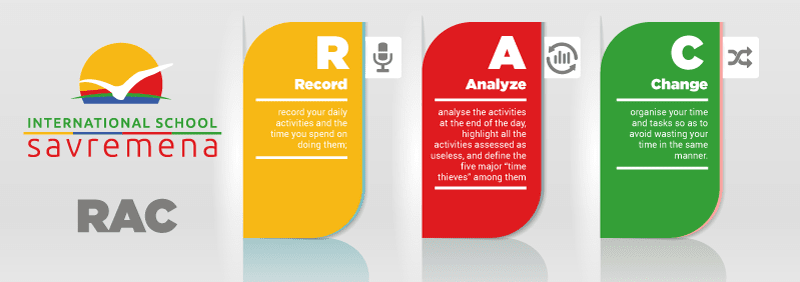
Do you ever find yourself in a situation where every other activity seems more interesting than usual, just when you need to prepare for an important school task scheduled for tomorrow?
If the answer is yes, you’re experiencing the same organisational problems as most students. And not just students - research has shown that as much as 95% of people occasionally put off their tasks, i.e. procrastinate. The reasons for putting off tasks may include fear of failure and the need to perform every task perfectly.
Also, procrastination may occur due to a lack of self-control, which refers to the inability to put off current needs and wants, despite the fact that you have urgent matters to attend to. Also, people who are not used to organising their time are prone to putting off their tasks.
Regardless of the reason behind it, procrastination refers to the avoidance of tasks. This means putting off tasks and obligations, which has negative consequences and exists despite the fact that we are aware of the importance of completing said tasks. This is why, when putting off tasks, people usually feel tense, worried and only partially enjoy doing other activities.
Due to the frequency of the problem, numerous researchers have dealt with the problem of consciously putting off tasks and have tried to provide effective solutions. It's been proven that the following helps in the fight against procrastination: securing conditions where nothing distracts us, activity plans, visualising success, scheduled time for performing specific activities and so on.
However, the most effective way to fight procrastination is to simply start an activity. Although it may seem difficult and time consuming at the beginning, once you overcome the initial resistance, you will no longer perceive the task as a problem. Respondents who have participated in studies on procrastination have said that tasks seemed more difficult and tiresome until they started performing them and that subsequently, they found it easier to focus on solving a problem or perform an activity.
The RAC method
The following techniques are useful for avoiding procrastination, provided a person recognizes their tendency to avoid starting an important task. However, they are often unable to do so.
In order to reduce the possibility of procrastination and “time thieves”, i.e. performing unimportant tasks and those that aren’t urgent, it is useful to abide by the RAC method for monitoring activities. This method provides you with the option to gain direct and objective insight into the way we manage our time:
R (Record) – record your daily activities and the time you spend on doing them;
A (Analyse) – analyse the activities at the end of the day, highlight all the activities assessed as useless, and define the five major “time thieves” among them;
C (Change) – organise your time and tasks so as to avoid wasting your time in the same manner.
People often underestimate the amount of time they spend doing trivial things that steal the time they would otherwise spend doing their tasks. Consequently, they indirectly and significantly reduce the amount of spare time for activities they truly enjoy doing. A realistic insight into time management, good organisation and starting activities on time will significantly contribute to a higher performance and provide you with more spare time.
Author: Milana Jovanović
Literature:
- How to manage your time effectively. (2016). Kent.ac.uk. Retrieved 28 April 2016, from https://www.kent.ac.uk/careers/sk/time.htm



















